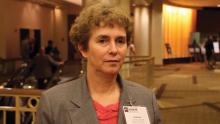WASHINGTON – Between 20% and 40% of headache patients have endured some kind of maltreatment during their early lives, several epidemiologic studies have concluded.
Yet no study has ever pinpointed exactly which individuals exposed to a particular type of abuse will develop a certain type of headache – or whether they will get headaches at all, Dr. Gretchen Tietjen said at the annual meeting of the American Headache Society.
Nor has any study ever conclusively proven the benefit of screening headache patients for childhood abuse, or even helping those patients cope with their history.
Many studies have attempted to show a benefit of screening and treatment, but these generally "come up empty-handed" said Dr. Tietjen, director of the headache treatment and research program at the University of Toledo (Ohio) Medical Center. "It’s very difficult to identify the downstream evidence of morbidity and mortality, and there is even some concern that we could actually cause harm by [recalling events] that are going to be very difficult for a patient to deal with. The risk/benefit ratio for this has never been clearly elucidated."
Multiple animal studies, and now some clinical ones, have found that chronic early life stress induces a host of physical changes that compromise the body’s ability to cope with stress later on. These changes can manifest not only as headache, but as fibromyalgia, irritable bowel syndrome, interstitial cystitis, and chronic fatigue. Anxiety and depression can emerge as well. And some research even suggests that early stress can lead to a lifelong elevation in inflammatory response, setting the stage for a host of other disorders.
The Adverse Childhood Experiences (ACE) study confirmed a strong association between childhood stress and adult headache. ACE included more than 17,000 adults and examined the relationship between frequent headaches and eight early stressors: emotional, physical, or sexual abuse; domestic violence; parental separation or divorce; and living with an adult who was mentally ill, a substance abuser, or engaged in criminal activity (Headache 2010;50:1473-81).
The study found a dose-response relationship between adverse events in childhood and the frequency of adult headaches, said Dr. Tietjen, who was a primary investigator on ACE. With a possible score of 0-8, subjects who reported having five or more early adverse experiences were more than twice as likely to also report adult headache.
Then again, "not everyone who has a stressful childhood or is abused as a child will develop headaches," Dr. Tietjen said in an interview.
The who’s and why’s are still elusive, said Dr. Linda Carpenter, a psychiatrist and researcher at Brown University, Providence, R.I. The end result emerges from a complex and still somewhat mysterious brew of innate temperament, stress type and duration, and environmental mediators. Animal data not only support a neurobiologic link, but an epigenetic link as well. Chronic stress has the ability to change DNA expression, permanently altering the way a body responds to stress. And those changes may even become part of a new generation’s genetic makeup.
Some research also suggests that a new environment can reverse the physical changes of chronic stress. Rats separated from their mothers as babies develop elevated stress responses as they mature. But after living in an enriched environment – a cage with interconnecting burrows and toys to play with – their corticosterone levels during a stress test returned to normal (J. Neurosci. 2002;22:7840-3).
Individual perceptions can moderate or enhance the downstream effects of early maltreatment, said Dr. Elliott Schulman, an ACE coauthor. What one person perceives as a stressful, abusive situation may not trigger the same response in another. The reaction of adults aware of the early situation can also color the final picture, said Dr. Schulman, a neurologist at the Lankenau Headache Center in Wynnewood, Pa.*
He described a patient with refractory headache who recalled girlhood vacations during which a relative "repeatedly groped her." She reported this to her parents, who assured her that "groping" was not sexual abuse. "If the person believes it was abusive, then it was, for that person," said Dr. Schulman, who routinely addresses abuse during his patient intake. Before the initial visit, each patient receives a registration packet that includes a personal history questionnaire. At the very end of the questionnaire, after the social and marital history, it asks: "Have you been abused?"
The patient can check yes or no and, if the answer is yes, he or she can select the type – physical, emotional, or sexual. "This is akin to every other assessment we do," he said. "We ask if patients are smoking, exercising, sleeping well, having unprotected sex, using drugs. We incorporate all this into a routine history. And now that I have incorporated this question as well, I have found out patients want you to ask. If you do, they will tell you."


